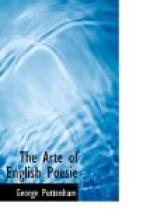there is litle or nothing worth commendation to be
founde written in this arte. And those of the
first age were Chaucer and Gower both
of them as I suppose Knightes. After whom followed
Iohn Lydgate the monke of Bury, & that nameles,
who wrote the Satyre called Piers Plowman, next
him followed Harding the Chronicler, then in
king Henry th’eight times Skelton,
(I wot not for what great worthines) surnamed the Poet
Laureat. In the latter end of the same
kings raigne sprong vp a new company of courtly makers,
of whom Sir Thomas Wyat th’elder & Henry
Earle of Surrey were the two chieftaines, who hauing
trauailed into Italie, and there tasted the sweete
and stately measures and stile of the Italian Poesie
as nouices newly crept out of the schooles of Dante
Arioste and Petrarch, they greatly pollished
our rude & homely maner of vulgar Poesie, from that
it had bene before, and for that cause may iustly
be sayd the first reformers of our English meetre and
stile. In the same time or not long after was
the Lord Nicholas Vaux, a man of much facilitie
in vulgar makings. Afterward in king Edward
the sixths time came to be in reputation for the same
facultie Thomas Sternehold, who first translated
into English certaine Psalmes of Dauid, and Iohn
Hoywood the Epigrammatist who for the myrth and
quicknesse of his conceits more then for any good
learning was in him came to be well benefited by the
king. But the principall man in this profession
at the same time was Maister Edward Ferrys
a man of no lesse mirth & felicitie that way, but
of much more skil, & magnificence in this meeter, and
therefore wrate for the most part to the stage, in
Tragedie and sometimes in Comedie or Enterlude, wherein
he gaue the king so much good recreation, as he had
thereby many good rewardes. In Queenes Maries
time florished aboue any other Doctour Phaer
one that was well learned & excellently well translated
into English verse Heroicall certaine bookes of Virgils
Aeneidos. Since him followed Maister Arthure
Golding, who with no lesse commendation turned
into English meetre the Metamorphosis of Ouide,
and that other Doctour, who made the supplement to
those bookes of Virgils Aeneidos, which Maister
Phaer left vndone. And in her Maiesties
time that now is are sprong vp an other crew of Courtly
makers Noble men and Gentlemen of her Maiesties owne
seruauntes, who haue written excellently well as it
would appeare if their doings could be found out and
made publicke with the rest, of which number is first
that noble Gentleman Edward Earle of Oxford,
Thomas Lord of Bukhurst, when he was young,
Henry Lord Paget, Sir Philip Sydney,
Sir Walter Rawleigh, Master Edward Dyar,
Maister Fulke Greuell, Gascon, Britton,
Turberuille and a great many other learned




